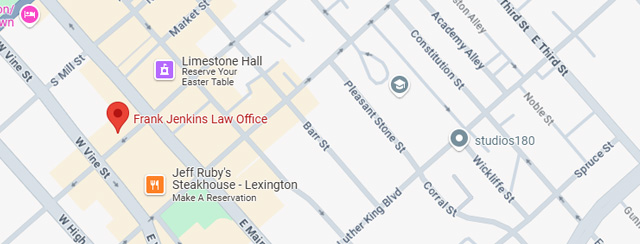- ATV accidents
- Brain Injuries
- Bus Accident
- Car Accidents
- Construction Accident
- Distracted Driving
- Drugged Driving Accident
- DUI
- Firm News
- Mass Tort
- Medical Malpractice
- Motorcycle Accidents
- Pedestrian Accidents
- Personal Injury
- Product Liability
- Safety
- Social Security Disability
- Truck Accidents
- Vehicle Accidents
- Workers Compensation
- Workplace Injuries
A few days ago, Kentucky Governor Andy Beshear announced in a press conference that a Nelson County man, who had tested positive for the novel coronavirus (COVID-19), was now under forced quarantine after his refusal to self isolate. Governor Beshear explained that he had worked with “county judges and others” to protect the greater good of the community. The news of a non-crime-committing American being compelled into involuntary sequestration has drawn international attention. Additionally, the situation has raised a few citizen eyebrows in the land of the free, especially among Kentuckians. Many of us were left wondering where government authority begins and ends in regard to our daily freedoms.
If you’re a resident of Nelson County, or of a neighboring community, you may be in full support of the forced confinement placed upon the fifty-three-year-old man who officials say tested positive for COVID-19. After all, you don’t want this highly contagious virus running roughshod through your neck of the woods. Who would, right?
However, the wife of the Nelson County man is claiming that her husband is not infected with COVID-19, that he was never tested, and that his medical records show he was never tested. She asserts that her husband has chronic obstructive pulmonary disease (COPD) and that he was advised by his pulmonologist to seek treatment at the emergency room because he was experiencing critically low oxygen levels, not because he was symptomatic of coronavirus.
The wife also stated that she and her family have been receiving death threats since the story broke. With police conspicuously stationed outside their home around the clock, anonymity was never going to be an option for this family in their small, rural area. The stigma attached to being portrayed as reckless, uncaring carriers of a dangerous contagion that’s bringing the world to a standstill is not going to be an easy reputation to overcome.
Proof as to whether the Nelson County man actually has COVID-19 is currently being sought by the patient and his attorney. In the meantime, the rest of us are left to wonder if the same situation could happen to us. As with most questions of the law, the best answer is it depends.
Overall, the government’s power to implement measures in the interest of public safety against an epidemic are broad and far reaching. That power is mainly divided between federal and state/local governments.
To begin, it’s important to understand that our Constitution provides the basis for federal quarantine decisions under the Commerce Clause, which allows Congress “to regulate Commerce with foreign Nations, and among the several States.”¹ In effect, it gives the federal government the power to quarantine at our nation’s border, or to prevent movement of the infected from state to state. Under this Commerce Clause, the Public Health Service Act was passed in 1944 that gave the executive branch the power to enforce quarantines.²
The Public Health Service Act has been amended several times over the years and now gives the secretary of health and human services the power to grant actionable authority to the Centers for Disease Control and Prevention (CDC), as well as make recommendations to the president about issuing regulations that “provide for the apprehension, detention, or conditional release of individuals . . . for the purpose of preventing the introduction, transmission, or spread of such communicable diseases…” as may be specified in Executive orders.
A public health emergency concerning the novel coronavirus was declared on January 31, 2020 by Health and Human Services Secretary Alex Azar. This declaration opens up many more regulatory powers to the federal government, including being able to preempt the power of individual states’ rights as outlined in the Tenth Amendment to the Constitution. For instance, if the federal government feels that states aren’t handling the coronavirus crisis appropriately, the feds could assume control over the states’ management of the crisis and impose its own standard, which could include a national quarantine.
Against this background of the federal government’s authority, let’s now consider the power of states as related to quarantine. The Tenth Amendment provides to the states what is commonly referred to as “police power,” which is the power to establish its own laws that will protect the safety, health, and welfare of its residents.³ Each state will have its own laws that allow the governor or state health officials to enact and enforce the quarantine and isolation of its population.
Governor Beshear’s statement about how he had worked with “county judges and others” in the handling of quarantining the Nelson County man was a clear example of Kentucky’s statute regarding quarantine and isolation that reads the Cabinet for Health and Family Services “…shall take such action and adopt and enforce such rules and regulations as it deems efficient… and to accomplish these objects shall establish and strictly maintain quarantine and isolation at such places as it deems proper.”(4) As you can see, the law defers to state government’s discretion in these matters, giving local authorities much leniency in the handling of infectious and contagious disease cases.
Individual liberty can never be taken for granted in this country. The ability for citizens, who have committed no crime, to move freely about in public is an essential element of the American way of life. Therefore, it stands to reason that the case of a fellow Kentuckian being placed in forced quarantine, with police officers standing guard outside his home twenty four hours per day, gives most of us pause, especially considering the ambiguity surrounding whether or not he tested positive for COVID-19. The hostage-in-your-home situation would be unwelcome, to say the least.
But could it happen to you or me if it happened to that local family? Again, it depends.
We are entering uncharted waters as this novel coronavirus brings our regular lives to a halt. Drastic measures are being taken both locally and nationally to curtail the spread of the virus, and hopefully those measures will benefit our communities in the long run. As of today, it’s impossible to predict when COVID-19 will loosen its grip, or what collateral damage will be left in its wake.
Lawyers answer with “it depends” when the question is too complex for a simple answer. What we know is that there are both federal and state laws in place that allow for a considerable amount of discernment to be entrusted to our government officials in regard to the voluntary/involuntary quarantine and isolation — in part or in whole — of its populace. Hopefully our communities can find equilibrium between preserving individual liberty and protecting public health.
References:
1. Commerce Among the Several States: Constitution Annotated: Congress.gov: Library of Congress. (n.d.). Retrieved March 19, 2020, from https://constitution.congress.gov/browse/essay/artI_S8_C3_1_2/
2. 42 U.S. Code § 264 – Regulations to control communicable diseases. (n.d.). Retrieved March 19, 2020, from https://www.law.cornell.edu/uscode/text/42/264
3. The Constitution. (n.d.). Retrieved March 19, 2020, from https://www.whitehouse.gov/about-the-white-house/the-constitution/
4. Morgan, R., & Sims, L. (n.d.). State Quarantine and Isolation Statutes. Retrieved March 18, 2020, from https://www.ncsl.org/research/health/public-health-chart.aspx


